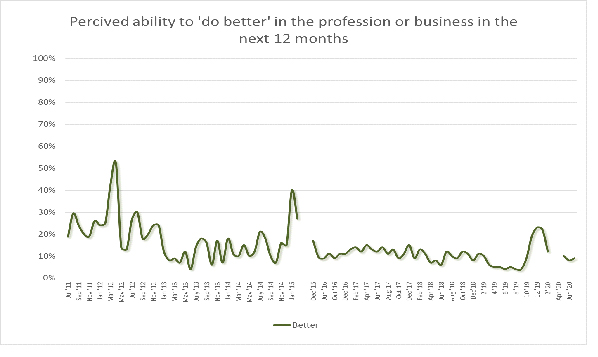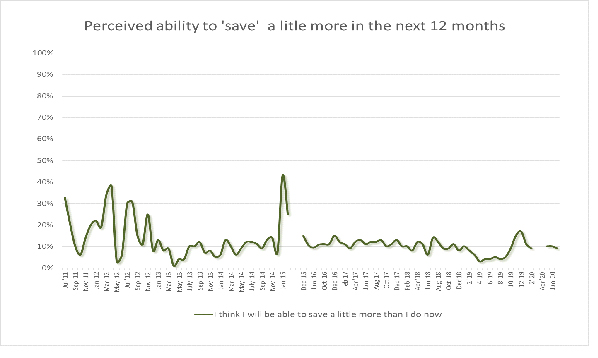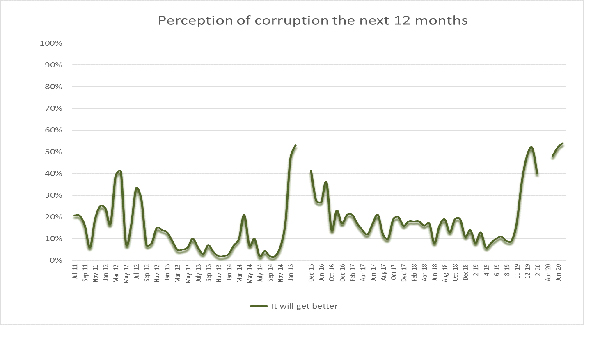August, 4, 2020

Coronavirus disruption keeps hope subdued. Will the gradual opening up of the economy and a win for President Rajapaksa at the general election improve the situation?
The Covid19 lock-down and curfew disrupted most economic and social activity during March and April of 2020 and as a result our survey was not conducted for these two months. Given this disruption, we extend the reporting period to July 2020 as opposed to the usual quarter end month of June.
Methodology
The PEOI is calculated based on data collected on an island-wide random survey of face-to-face interviews of 500 persons.
Presentation of Findings
We have experimented with presentation of the findings of the survey over the years since we initiated the study in July 2011 and settled on highlighting the share of respondents who perceive their economic opportunities would get better in the coming 12 months in comparison to the present. Answers to a couple of other selected questions (from eleven we pose to the respondents) are regularly presented while others we do whenever we see fit.
Perceived Economic Opportunity
The question posed to the respondents is if they believe their opportunities, be it in the workplace or in their business would increase, stay the same or diminish in the year ahead.

The rise in the hope of better economic opportunities post the presidential elections of November 2019 of an almost 5 year high of 23 percent had evaporated to 12 percent with the onset of the fear of the Covid19 pandemic before it actually caused the lock-down of the economy by late March 2020. The first post-lock-down measurement in May was 10 percent. In the following two months of June and July the perceptions continued to hover at very low levels of just 9 and 8 percent respectively. At the same time those who perceived their economic fortunes to decline in the year ahead rose sharply to 52 percent in May and held at 37 and 42 percent respectively for the following two months.
This is not unexpected as the worst fears of the people seemed to be coming true with unprecedented disruptions to the economy with tens of thousands of job losses and total shut down of certain industries such as tourism related. While the hardest hit, particularly daily wage earners and micro scale self-employed, was given LKR 5,000 per month handout by the government over two months many found it difficult to make ends meet. Some employers had no option but to restrict working days and offer just LKR 14,500 per month salary. Middle level workers also ran into issues in terms of inability to make their personal lease and loan payments while employers had to deal with serious cash flow issues to make salary and other payments.
Whether the perceptions would change with the gradual easing of the restrictions placed and virtually a complete return to normalcy in most areas of the economy will be seen in the coming months. It is also relevant to note that the general election result of August 6 will have a significant impact on the hope for the future. As pointed out in the last report it is possible that the dissipation of hope was due to the feeling that the transition to the new government was still incomplete as the President didn’t have a majority in Parliament to carry out his plans. Given it is all but certain that President Rajapaksa will be able to record a convincing win at the parliamentary election, the question really is how strong will the resulting positive impact be in strengthening the perceptions on unfolding opportunities.
Perception on Ability to Save
Here our objective is to determine the perception on saving.

Having obtained their views on cost of living and ability to save some of what they earn, we ask the respondents on their perceptions on their personal savings in the coming 12 months. The perception on the public’s ability to save a ‘little more’ than what they do at present increased after the election of the new President but soon dissipated by February 2020. The perceptions remained at the same low levels in May, June and July at around 10 percent. This finding is consistent with that of the earlier on the hope for opportunities. By and large people are ‘very worried’ about the future and resigned to the fact their lives will not get any better anytime soon.
Perception on Corruption
Every day, people complain about corruption from the highest to the lowest person of authority. Whether factual or not the perception of corruption is high. The question posed is if the respondents perceive that corruption will lessen in the coming year.

As was the case in January 2015 presidential election the public in general expected corruption to fall. The figure rose to 52 percent in January but by February 2020 this expectation had fallen to 40 percent. However, in a very positive turn of events the perceptions turn around again and the number who expected corruption to fall increased to a 10-year high of 54 percent. If this was a result of the way in which the government carried out its tasks during the lock-down or if it was due to the involvement of the military to carry out the general government functions to ensure peoples safety without the usual petty corruption we shall see in the coming months as functions gradually move back to the normal procedures.
Concluding Thoughts
The general perception of the public about their future as captured by the two questions on economic opportunity and ability to save reflected a significant positive movement with the election of President Gotabaya Rajapaksa in November. However, that sense of positivity was short-lived with expectations falling to levels just above what was witnessed before the election in only a matter of three months. Thereafter with the unprecedented disruption of the economy due to the Covid19 lock-down the hope for opportunity starting in May through July was very subdued. With economic and social activity slowly returning to normal and also an almost guaranteed win for the President’s party at the general election scheduled for early August the resulting perception of the general public will be interesting to observe.
Policy makers can use the perceptions identified and tracked in this unique study we have been conducting monthly since July 2011 to develop and fine-tune their policies.
The Perceived Economic Opportunity was developed and is measured by the Foundation for Economic Freedom in Sri Lanka (FEF) in partnership with Friedrich Naumann Stiftung Fur Die Freiheit.
Video Story